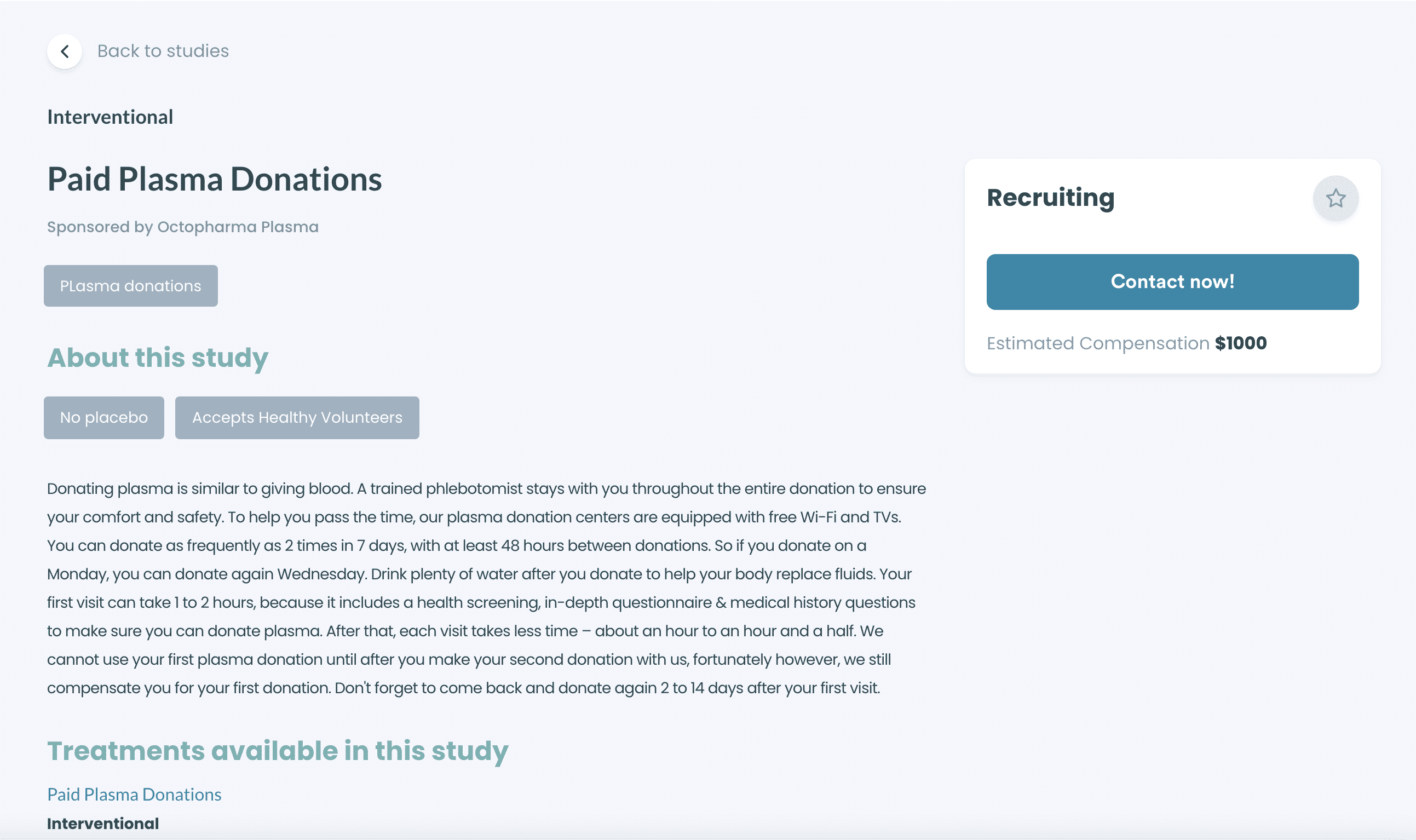Can You Donate Plasma If You Have Asthma?
Donating plasma is a selfless gesture that can help save lives and is usually compensated. Some people are, however, not eligible to donate their plasma, and therefore, you may be .
Well, this is one of those questions where you cannot simply say yes or no. Several factors come into play when determining if an asthmatic person can donate plasma. For instance, a person living with asthma cannot donate plasma are when:
- They are experiencing acute breathing problems
- They are going through a panic stage
- They are feeling uneasy before the donation
People with asthma can only donate plasma when:
- They have had no signs and symptoms of asthma two weeks prior to donation
- They are feeling healthy
- Their asthma medication does not affect their eligibility to donate
If you're unsure whether you can donate plasma because you're asthmatic, DoNotPay pay can help you learn more about the eligibility criteria or contact a clinic with questions.
Things an Asthma Patient Should Take into Account After Plasma Donation
can resume normal daily activities after plasma donation. You are, however, advised against lifting heavy objects five to six hours after donation. It is highly recommended that you consume lots of liquids and healthy food for the next 48 hours after the donation.
Plasma Donor Eligibility Requirements
So, what other factors are considered to determine if one is eligible to donate plasma? They include:
| Age | Different states have different age limits for plasma donation, and the majority of the states require plasma donors to be at least 17 years old. It is instructed that donors should be old enough to consent to plasma donation, hence the age limit. However, younger donors can still donate their plasma, but only with parental consent. |
| Weight | The standard weight for an ideal plasma donor should be at least 110 pounds or 50 kilograms to ensure secure donation. |
| General Health | Of course, your general well-being plays an important factor in your eligibility to donate. The staff will check your medical history to determine your eligibility. Some medical conditions like diabetes or heart disease may exempt you from donating plasma. Also, after every donation, your plasma will be tested for any transmittable infections. |
| Date of Last Donation | As per FDA regulations, you can donate plasma a maximum of twice a week, though not consecutively. The American Red Cross has, however, set up a different limit. You are allowed to donate plasma every 28 days for as much as 13 times a year. Plasma can be donated more frequently since your body can quickly replace the lost plasma within a short period. |
| Medications and Vaccines | Most medications will not exempt you from donating plasma. However, a few, such as blood thinners and insulin medication, will limit your ability to donate. You should inform the staff of any medication you are taking to determine your eligibility. |
Recent vaccination, e.g. the covid vaccine, will temporarily exempt you from donating, but you can donate your plasma after a given period.
How To Donate Plasma on Your Own
If you are eligible to donate plasma, ensure you clearly understand the donating requirements before going to the donation center. Do adequate research on the available donation centers before making an appointment. You can search on the internet for the closest donation center or get recommendations from family, friends, or colleagues.
Before going for the donation, you are advised to:
- Drink plenty of fluids
- Eat healthy foods
- Avoid fatty diets
- Avoiding alcohol or caffeinated drinks
Asthma patients are also recommended to try saline therapy at home before going for the donation.
At the donation center, especially if it is your first time donating, you'll be asked to show the following:
- A valid ID, driver's license, or passport
- Proof of your current address
- Your social security card
Next Step for Plasma Donation if You Can't Do It Yourself
DoNotPay is the solution for you if you are considering plasma donation, but researching the requirements needed and whether you are eligible or not seems like a tedious and time-consuming task. Whether it is your first time or you have donated plasma before, DoNotPay makes the whole process easier for you.
We'll do the groundwork for you and get back to you with all the information and requirements you need before donating plasma. We'll also find the nearest donating center on your behalf, make appointments and inquire about the payment you may get as compensation.
Here's How You Can Use DoNotPay To Become a Plasma Donor
- Search "plasma donations" on DoNotPay and find the nearest donation clinic through our clinical trials product.

- Select the "Contact Now" button to learn more about eligibility criteria, contact the clinic with questions, or sign up for first-time donor bonuses.

- Verify your information and submit your inquiry! DoNotPay will contact the clinic on your behalf and make sure your questions get answered.

DoNotPay Works Across All Companies With the Click of a Button
DoNotPay is also highly resourceful in getting information on plasma donation. We can help you with other issues such as:
- How long does plasma donation take
- Find the best paying medical surveys
- Ways to donate plasma for money
What Else Can DoNotPay Do?
Other than providing information on plasma donation, DoNotPay provides essential information and solutions to other issues like:
- Requesting sick leave on your behalf
- Canceling timeshares
- Making insurance claims
- Getting free trials
Sign up for DoNotPay to enjoy these services and many more!
 By
By